- Fed officials get set to gather for their annual economic symposium in Jackson Hole, Wyoming, this week.
- All eyes will be on Fed Chair Jerome Powell’s keynote speech on Friday.
- Investors will be closely listening for hints on when, and how much, the Fed plans to cut interest rates in 2024.
- Looking for a helping hand in the market? Try InvestingPro for under $8/Month.
As the S&P 500 regains its footing after a volatile few weeks, all eyes are on Federal Reserve Chair Jerome Powell's upcoming speech at the annual Jackson Hole Economic Symposium.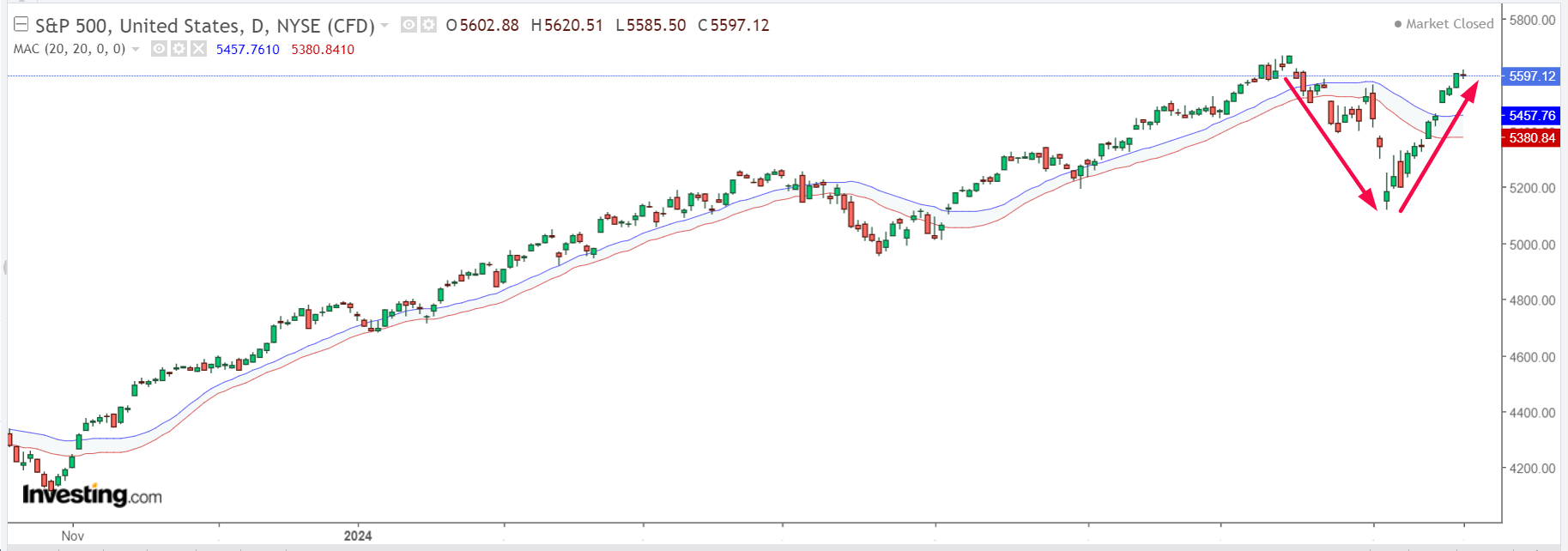
Source: Investing.com
With inflation cooling to its lowest levels since 2021 and economic data showing resilience, investors are eagerly awaiting clues from the Fed chief on the direction of interest rates, particularly the likelihood of a rate cut at the September FOMC meeting.
Powell is scheduled to deliver his highly anticipated keynote speech at 10:00 AM EST on Friday, at which he is likely to give signals that the central bank is poised to begin gradually cutting rates starting next month. As confidence in a ‘soft landing’ for the economy grows, the big question for investors at this point isn’t whether the Fed will cut rates, but rather by how much and how fast.
As of Wednesday morning, markets were pricing in a 69% chance that the Fed would lower interest rates by 25-basis points by the end of September and a 31% chance of a deeper 50-basis point cut, according to the Investing.com Fed Monitor Tool. A week ago, the odds of a more significant cut were higher, reflecting the evolving expectations surrounding the Fed’s next move.
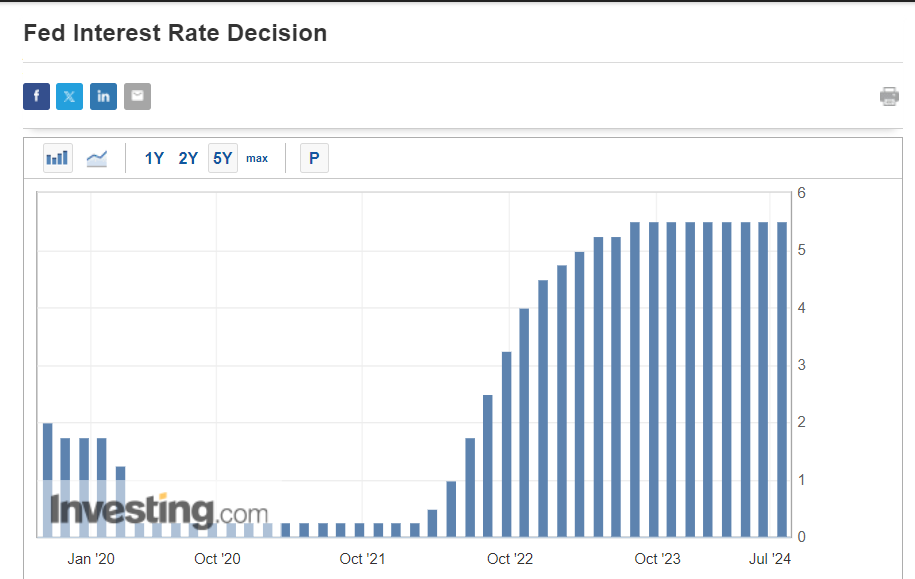
Source: Investing.com
Overall, the market is currently betting on nearly 100-basis points of rate cuts by the end of the year, which would bring the Fed funds rate back down to 4.25%.
The Fed's Dual-Mandate Balancing Act
With the Fed’s dual mandate of maintaining price stability and maximizing employment, Powell’s speech at Jackson Hole could signal a long-awaited shift in focus. While inflation has been the primary concern for the past few years, the recent cooling trend and a slowing job market suggest that unemployment could now be taking center stage.
As seen below, the U.S. unemployment rate rose to 4.3% in July, its highest level since October 2021, while headline CPI declined to 2.9%, the lowest since March 2021.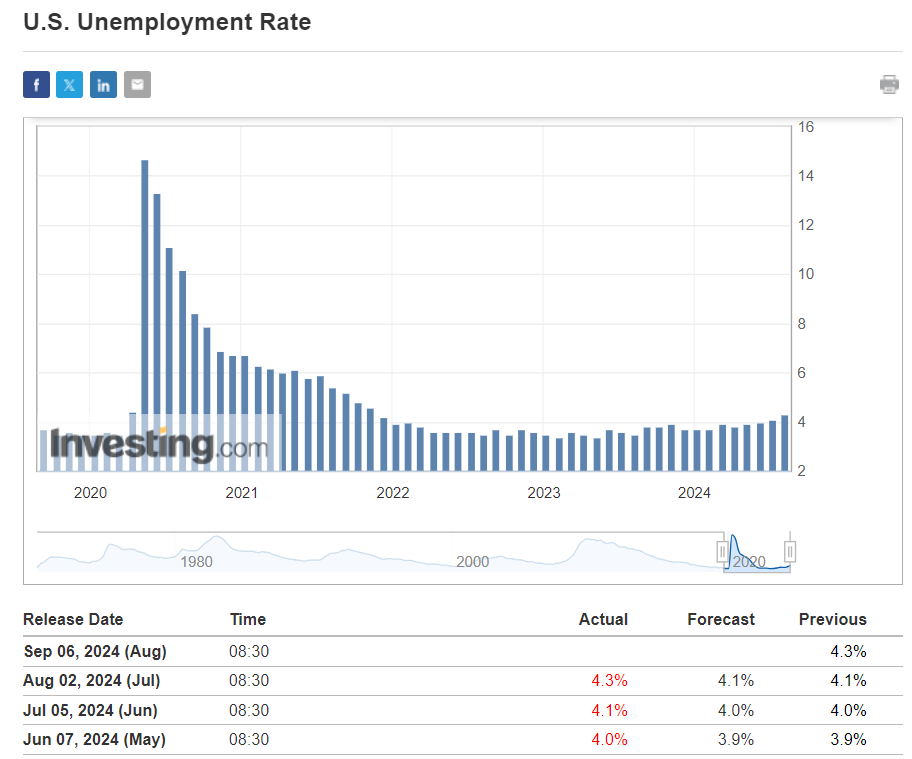
Source: Investing.com
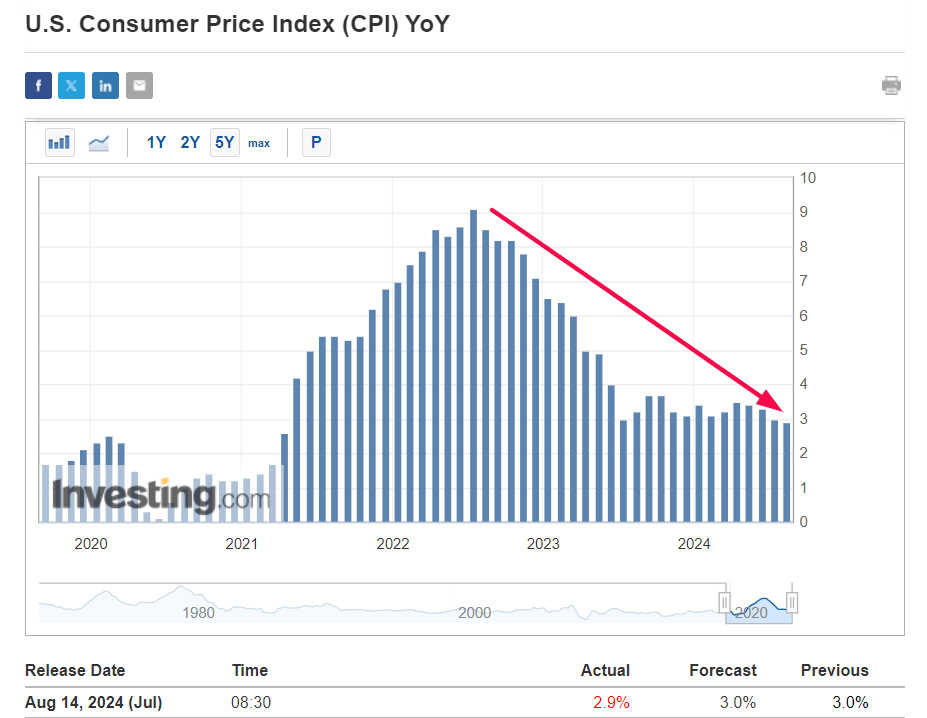
Source: Investing.com
Rising unemployment and mounting evidence that inflation is under control could pressure the Fed to pivot towards supporting employment, potentially leading to a more accommodative monetary policy. As such, the upcoming U.S. jobs report on September 6th will be particularly important, as any surprises in that data could significantly influence the Fed’s decision-making process.
A strong jobs report that reverses July’s softness could bolster confidence that growth risks have subsided, while another weak report could reignite concerns about the economy’s trajectory.
Market Implications
Powell’s speeches are known for their significant impact on financial markets, and this one is no exception. If he signals that the anticipated rate cuts may be less severe than investors currently expect, it could trigger a strengthening of the U.S. Dollar and a spike in Treasury yields as well as a potential sell-off in equity markets.
On the other hand, if Powell aligns with market expectations and strikes a dovish tone, the benchmark S&P 500 and tech-heavy Nasdaq Composite could surge higher, while the U.S. dollar and Treasury yields would likely continue their downward path. That would also see gold prices extend their record run to new all-time highs.
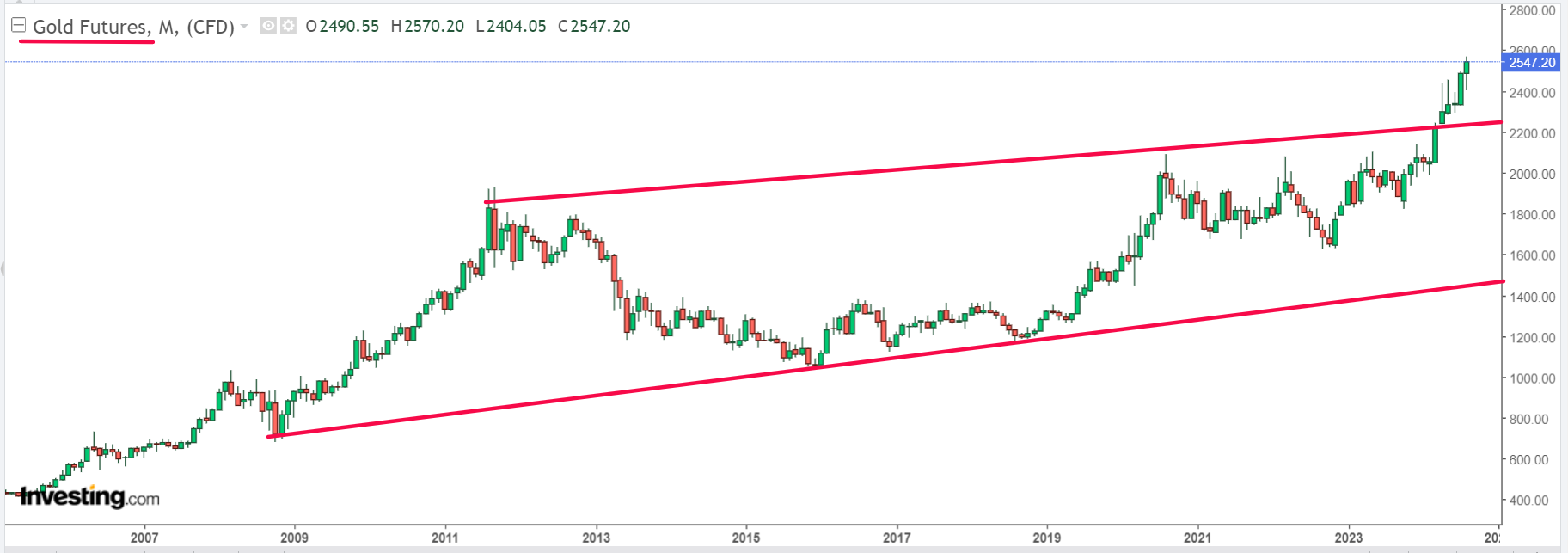
Source: Investing.com
Equity markets have been particularly volatile, with recent sell-offs due to heightened recession risks in the U.S., followed by a rebound driven by the easing of those fears. The blue-chip Dow Jones Industrial Average has moved back above 40,000, and the S&P 500 is approaching record highs again, led by a strong rally in technology stocks.
However, concerns about U.S. growth persist, and Powell’s speech could either fuel further gains or spark a rapid sell-off, depending on the signals he provides.
Trading Strategies for Jackson Hole
As the market awaits Powell’s remarks, the stakes are high. Given the high volatility expected around the Jackson Hole Symposium, traders should prepare for potential market swings. The current market sentiment already reflects expectations of lower interest rates in the long term, as seen in the recent weakness of the USD and movements in 10-year U.S. Treasury yields. However, any deviation from these expectations in Powell’s comments could reverse this trend.
Investors and traders alike will be closely monitoring his words, ready to adjust their strategies based on the direction he sets for U.S. monetary policy.
To navigate the current market volatility I used the InvestingPro Advanced Stock Screener to build a watchlist of high-quality stocks that are showing strong relative strength and have healthy growth prospects.
Not surprisingly, some of the notable names to make the list include tech-heavyweights such as Microsoft (NASDAQ:MSFT), Nvidia (NASDAQ:NVDA), Alphabet (NASDAQ:GOOGL), Amazon (NASDAQ:AMZN), Meta Platforms (NASDAQ:META), Broadcom (NASDAQ:AVGO), Netflix (NASDAQ:NFLX), Palo Alto Networks (NASDAQ:PANW), and Palantir (NYSE:PLTR).
Meanwhile, Visa (NYSE:V), Mastercard (NYSE:MA), Costco (NASDAQ:COST), TJX Companies (NYSE:TJX), Booking Holdings (NASDAQ:BKNG), and Marriott International (NASDAQ:MAR) are a few consumer-sensitive stocks to make the cut.
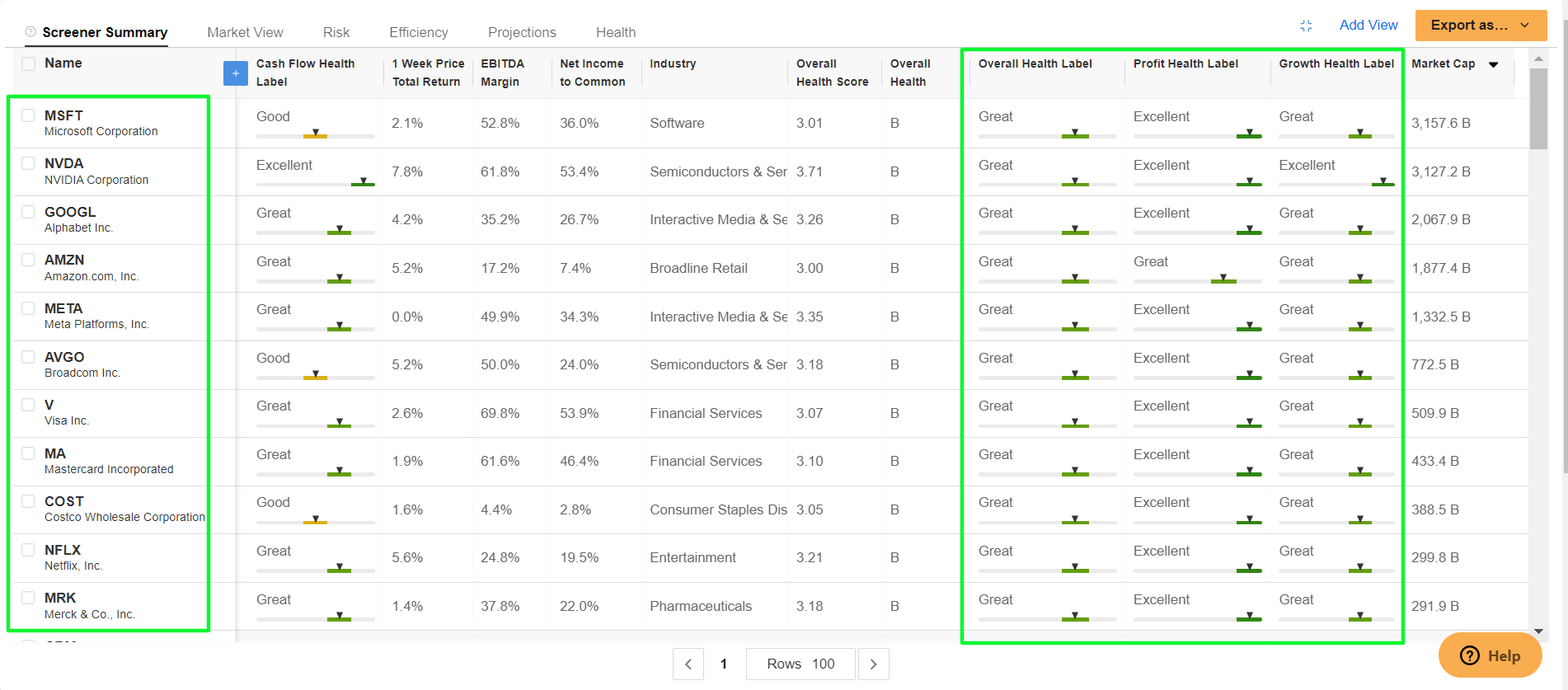
Source: InvestingPro
For the full list of the 48 stocks that met my criteria, click here.
Whether you're a novice investor or a seasoned trader, leveraging InvestingPro can unlock a world of investment opportunities while minimizing risks amid the challenging market backdrop.
Try InvestingPro today and take your investing game to the next level.
***
Disclosure: At the time of writing, I am long on the S&P 500, and the Nasdaq 100 via the SPDR® S&P 500 ETF, and the Invesco QQQ Trust ETF. I am also long on the Technology Select Sector SPDR ETF (NYSE:XLK).
I regularly rebalance my portfolio of individual stocks and ETFs based on ongoing risk assessment of both the macroeconomic environment and companies' financials.
The views discussed in this article are solely the opinion of the author and should not be taken as investment advice.
Follow Jesse Cohen on X/Twitter @JesseCohenInv for more stock market analysis and insight.

